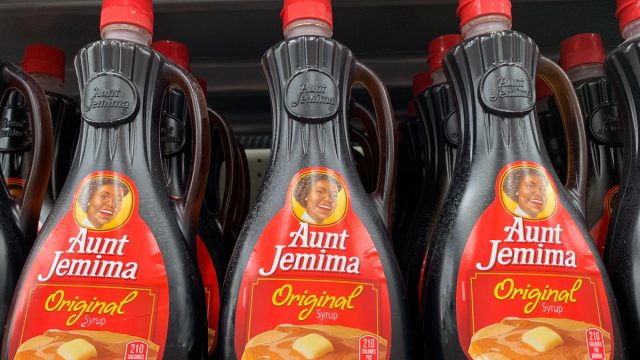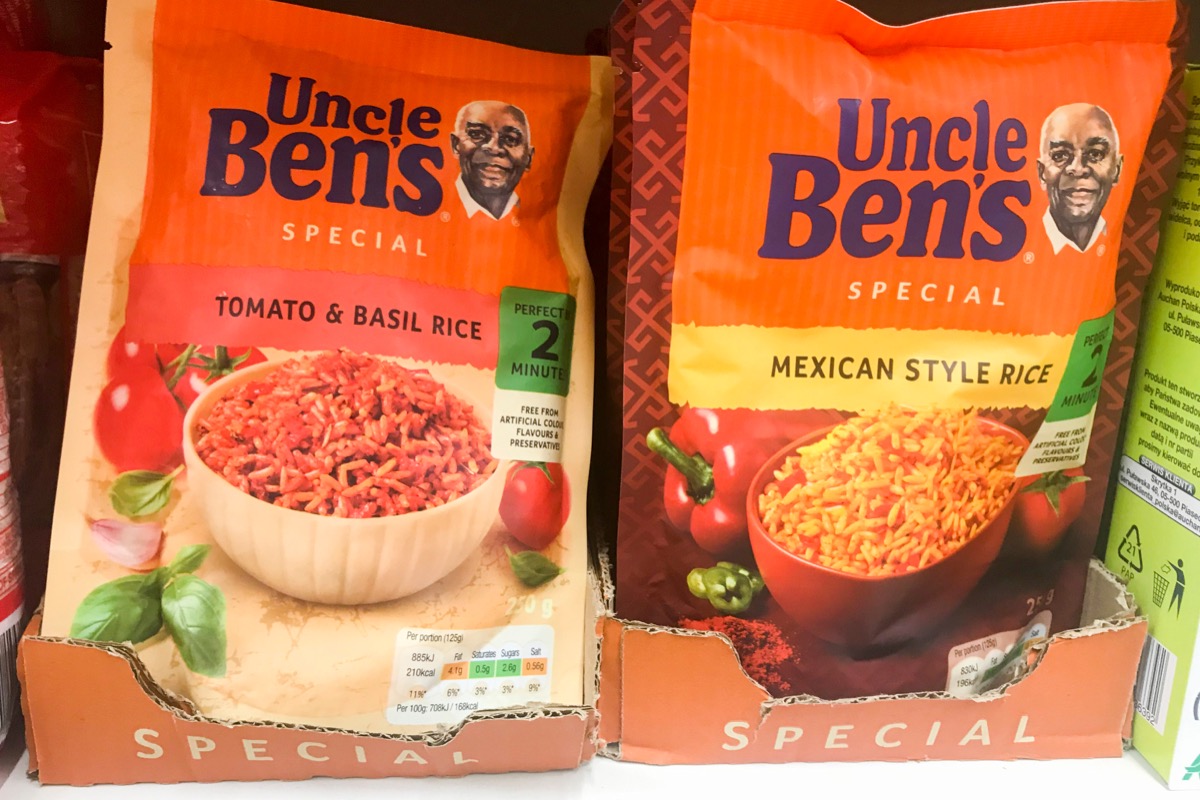These Familiar Logos Are Getting Transformations Due to Their Racist Origins

The Black Lives Matter movement has encouraged many people to re-examine themselves and aspects of the culture around them through a different lens, and that includes some product logos that have been around for decades. Some brands are taking or considering taking steps to finally retire logos that have racist origins. So prepare for your pantry to look a little different in the future.
Aunt Jemima, a familiar line of breakfast products that’s been around for 131 years, is responding to consumers’ requests that they rebrand. (Aunt Jemima is a part of Quaker Foods, which is owned by PepsiCo.) You’ll be able to find the overhauled pancake mix and syrup on shelves by the fourth quarter of 2020, according to The Associated Press. A new name for the line has yet to be announced. “We recognize Aunt Jemima’s origins are based on a racial stereotype,” Kristin Kroepfl of Quaker Foods North America said of the change. “While work has been done over the years to update the brand in a manner intended to be appropriate and respectful, we realize those changes are not enough.”
The “racial stereotype” Kroepfl acknowledged is the “mammy,” of which Aunt Jemima is a prime example. This character—an older, larger Black woman—was a staple of minstrel shows in the 1800s, and usually dressed exactly in the manner of older versions of the breakfast logo: in a head scarf and polka dotted dress. The brand even got its name from a minstrel show song called “Old Aunt Jemima,” which was sometimes performed by a white singer in blackface.
Over time, Quaker Foods has tried to distance the woman on the syrup bottle from that stereotype. Aunt Jemima was updated to resemble a modern woman. But no matter what changes were made, the history of the logo would never go away. “Brand managers have been aware of that for years and have tried, largely through incremental updates to the character’s image on the packaging, to modernize how she is seen. The headscarf is gone, they’ve added a lace collar, pearl earrings. But the effect, because of the name, is the same,” James O’Rourke, professor at the University of Notre Dame’s Mendoza College of Business, told The Associated Press. Now, the company is finally embarking on a complete overhaul of the logo and name.

Within hours of the Aunt Jemima announcement, Mars, which owns Uncle Ben’s, put out a press release declaring its own intentions to reevaluate its imagery. “We recognize that now is the right time to evolve the Uncle Ben’s brand, including its visual brand identity, which we will do,” it reads. The company also said that it’s not been determined yet what the changes will look like or when they will come, but that they are looking at different options.
According to the company’s website, the popular rice brand was founded by two white men who named it after “legendary Texan farmer, Uncle Ben, who was known for his exceptionally high-quality rice.” And the man on the packaging is actually “Frank Brown, a maitre d’hotel at an exclusive Chicago restaurant who agreed to pose for the Uncle Ben’s portrait.”
In 2007, Mars was criticized when Uncle Ben’s was rehauled, turning the man in the ads into—per The New York Times—“an accomplished businessman with an opulent office, a busy schedule, an extensive travel itinerary and a penchant for sharing what the company calls his ‘grains of wisdom’ about rice and life.”
“A crucial aspect of his biography remains the same, though,” the Times added. “He has no last name.”
This is important, as one of the sensitivity issues with these brands is that aunt and uncle titles were used in the pejorative by white people in early American history in place of actual titles for people of color.
RELATED: For more up-to-date information, sign up for our daily newsletter.
The Uncle Ben’s and Aunt Jemima announced changes come on the heels of another brand’s. In early 2020, Land O’Lakes announced they were changing their branding to be farmer-focused. In doing so, they removed the indigenous woman who had been pictured on their products for decades. The press release cited the need for “packaging that reflects the foundation and heart of our company culture.”
For more progress, here are 8 Changes That Have Happened Since Black Lives Matter Protests Started.